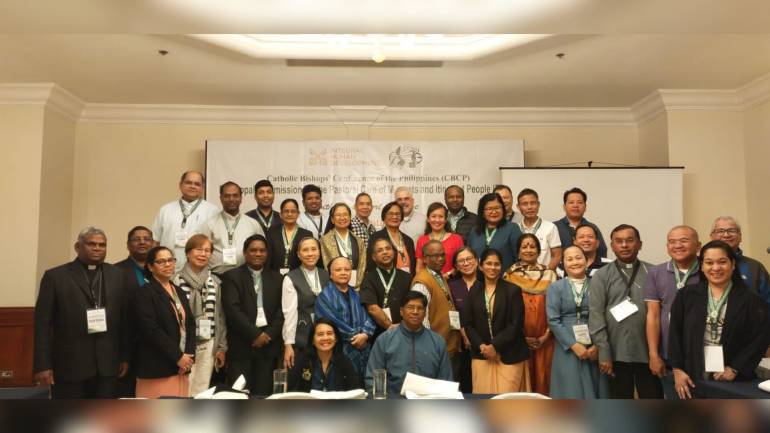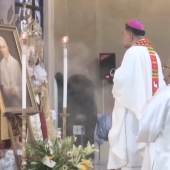Church organizes training for Asian migrant workers

A two-day program for 54 Asian migrant workers from various Asian countries, with 22 delegates from India, was held at the Manila Prince Hotel in the Philippines from February 12–17.
In collaboration with the Vatican Dicastery for Integrated Human Development and the Commission for Migrants—Conference of Catholic Bishops of India (CCBI), the Episcopal Commission for the Pastoral Care of Migrants and Itinerant People (ECMI) of the Catholic Bishops' Conference of the Philippines (CBCP) organized the training program.
Participants covered the following topics: the challenge of religious diversity in migration, the understanding of migration in Asia, migration in the Bible, the theology of migration, the teachings of the Church on migration, the history of pastoral care of migration, the role of laity in ministry to migrants, pastoral care of seafarers and fishermen, and advocacy and networking on migration and the human rights of migrants.
This program provided a forum for educating migrant workers, encouraging compassionate action, and developing discourse. Participants also had the opportunity to participate in exposure programs designed to increase their understanding and empathy for migrants' experiences.
Monsignor Fabio Baggio, Undersecretary to the Vatican's Dicastery for Integral Human Development, addressed the participants about the freedom of every human being to "leave their homeland and choose their destination in this world."
He also highlighted the importance of respecting the dignity and rights of migrants, regardless of their status or background.
Ms. Francesca Donà, Regional Coordinator of the Asia, Middle East, and Oceania Dicastery for Promoting Integral Human Development, helped the participants understand the dicastery's programs to assist the pastors in caring for the migrants.
In his address, Archbishop Victor Henry Thakur, the Chairman of the CCBI Commission for Migrants, and the Archbishop of Raipur, Chhattisgarh, talked about love, respect, and acceptance towards migrants.
Karnataka Regional Bishops' Council Chairman and Bangalore Archbishop Peter Machado highlighted the vital contributions made by migrant laborers.
"They enhance our lives. Since migrant laborers were absent, Bangalore saw a notable standstill during the difficult COVID-19 pandemic. The prelate emphasized that, as a result, businesses and organizations were forced to airlift workers from their countries of origin," said Bishop Machado.
Dr. Stephen Alathara, the Deputy Secretary General of the CCBI, spoke on the urgency of integrating the Catholic Church's teachings on social justice into everyday life. To uphold the dignity of every human being, Alathara emphasized the role of Catholic social teaching in addressing systemic issues such as poverty, inequality, and discrimination.
Ms. Christine Nathan, President of the International Catholic Migration Commission (ICMC), a consultant with the International Labor Organizations (ILO), and an expert in workers' issues, was very vocal about the need for comprehensive immigration reform at the recent United Nations conference on migration.
Furthermore, she advocated for enhanced cooperation among governments, civil society, and international organizations to develop policies that place migrants' welfare first.
Nathan emphasized the importance of taking concrete action and implementing policies to uphold the rights of migrant workers while acknowledging the organizers for their efforts.
"We gained a fresh perspective on the predicament of migrants, refugees, displaced people, and people on the move. The themes and speakers were extremely well chosen," Nathan said.
After completing the Migrant Exodus program, the CCBI Commission in India commits to advocating for the welfare and rights of migrant workers.
The commission intends to work in tandem with other organizations to address the challenges migrants face and strive to establish a more welcoming community that embraces people from all backgrounds.
The commission also hopes to interact with decision-makers and public servants to advocate for more comprehensive laws that safeguard migrant workers' rights and guarantee their equitable treatment at work.
Furthermore, their objective is to create a more positive narrative surrounding migration and increase awareness of the contributions that migrants bring to society.- Rani Punnasseril, HCM
Radio Veritas Asia (RVA), a media platform of the Catholic Church, aims to share Christ. RVA started in 1969 as a continental Catholic radio station to serve Asian countries in their respective local language, thus earning the tag “the Voice of Asian Christianity.” Responding to the emerging context, RVA embraced media platforms to connect with the global Asian audience via its 21 language websites and various social media platforms.














